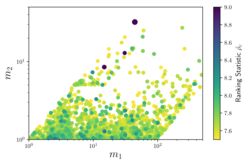First open gravitational-wave catalog of binary mergers
AEI researchers publish first open catalog of compact binary merger gravitational-wave signals in LIGO's O1 data
Scientists at the AEI and international colleagues have analyzed the open (publicly available) data from Advanced LIGO's first observation run (O1) and have produced 1-OGC the first open gravitational-wave catalog of binary merger signals. They recover the previously announced signals GW150914 and GW151226 and find that the candidate signal previously known as LVT151012 has a 97.6% probability of being astrophysical in origin and is therefore considered as true signal GW151012.
Paper abstract

We present the first Open Gravitational-wave Catalog (1-OGC), obtained by using the public data from Advanced LIGO's first observing run to search for compact-object binary mergers. Our analysis is based on new methods that improve the separation between signals and noise in matched-filter searches for gravitational waves from the merger of compact objects. The three most significant signals in our catalog correspond to the binary black hole mergers GW150914, GW151226, and LVT151012. We observe these signals at a true discovery rate of 99.92%. We find that LVT151012 alone has a 97.6% probability of being astrophysical in origin. No other significant binary black hole candidates are found, nor did we observe any significant binary neutron star or neutron star--black hole candidates. We make available our complete catalog of events, including the sub-threshold population of candidates.












